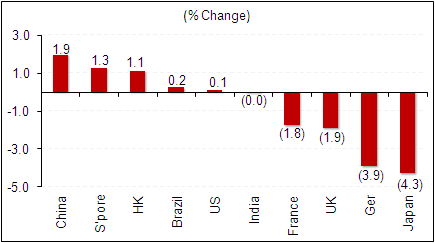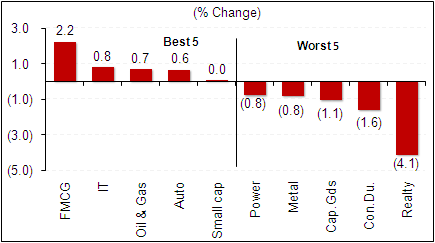India's Third Giant Leap
This Could be One of the Biggest Opportunities for Investors
- Home
- Todays Market
- Indian Stock Market News April 17, 2014
World markets have a mixed week Thu, 17 Apr RoundUp
In the week gone by, global markets delivered a mixed performance. While Asian markets barring Japan performed well, European indices faced selling pressure. In the US, economic news was mixed. While industrial production numbers beat forecasts housing statistics disappointed. The US Fed's Beige Book of anecdotal information on business activity showed a pickup in activity as the harsh weather conditions eased up.
European stocks struggled as the US dollar weakened due to the dovish statements by the US Fed. Profit booking was clearly evident before the Easter holidays in European indices as the German DAX, the British FTSE and the French CAC ended down by 3.9%, 1.9% and 1.8% respectively.
Back home, the Indian equity markets ended flat after starting the week on a negative note. The results season has begun and attention is now likely to shift to stock specific developments rather than expectations from the general elections.
 |
| Source: Yahoo Finance |
Most of the sectoral indices ended in negative territory for the week with realty (down 4.1%) and consumer durables (down 1.6%) being the biggest losers. IT (up 0.8%) and FMCG (up 2.2%) were the biggest gainers for the week.
 |
Now let us discuss some of the economic developments of the week gone by.
The Reserve Bank of India (RBI) has taken an important decision regarding the country's forex rate. The RBI has suggested setting up an independent body to recommend a benchmark forex rate. This, the RBI believes, will reduce the chance of forex manipulation by banks. The RBI has directed Fixed Income Money Market and Derivatives Association of India (FIMMDA) and Foreign Exchange Dealers Association of India (FEDAI) to take necessary steps to act as administrators of the Indian rupee interest rate and the forex rate respectively. The benchmark setting process is currently plagued with conflicts of interest due to the corporate governance structure of the two institutions. This is an important development after the manipulation of the London Interbank Overnight Rate (LIBOR) had come to light in June 2012. The suggestions will help to prevent such manipulation in the Indian forex markets.
Wholesale Price Index (WPI)-based inflation increased to 5.7% in March from 4.68% a month ago, snapping a three-month easing trend as fruit and vegetable prices started to climb up again. Food inflation rose to 9.9% in March from 8.1% in February and, within it, prices of vegetables jumped 8.5% compared with a 3.9% rise a month ago and that of fruits rose 16.1% compared with a 9.9% growth earlier. Fuel inflation increased to 11.2% from 8.7% a month ago as the government raised cooking gas prices. According to the data released by the Government today, the January inflation number has been revised upwards to 5.1% as well.
Business confidence, as reflected in the Index for Industrial Production (IIP), de-grew 1.9% in February against the 0.8% growth in January, while the country's trade deficit hit a five-month high in March at US $10.5 bn. The IIP data showed de-growth in capital goods at 17.4% against the previous month's de-growth of 4.2%, while consumer durables also de-grew at 9.3% against the negative growth of 8.3% in the earlier month. Consumer non-durables contracted 1.2% against the previous month's growth of 4.4% and consumer goods fell by negative 4.5% versus the previous month's de-growth of 0.6%. The most disappointing part is decline in the growth rate of 13 out of the 22 industry groups in the manufacturing sector during February 2014.
As per a leading financial daily, India turned into a net steel exporter in FY14 after a gap of five years. According to the Joint Plant Committee, steel exports increased by 4% to 5.6 million tonnes (mt) whereas steel imports slumped by 31% to 5.4 mt in 2013-14. Going forward, steel exports are likely to be hit by the recent rupee appreciation as well as the expected recovery in the infrastructure projects in the country post elections that is likely to boost domestic steel demand. Domestic steel consumption in FY14 clocked a growth of a mere 0.6%, the slowest in last four years, to reach 73.9 mt. However JSW Steel has said that despite improvement in domestic demand, steel companies will continue to focus on exports backed by higher production and no currency fluctuations.
| Company | 11-Apr-14 | 17-Apr-14 | Change | 52-wk High/Low | ||
| Top gainers during the week (BSE-A Group) | ||||||
| Future Retail | 86 | 107 | 25.0% | 158/63 | ||
| Adani Enterprise | 382 | 439 | 15.0% | 478/126 | ||
| Crompton Greaves | 165 | 189 | 14.5% | 188/72 | ||
| Reliance Infra | 462 | 522 | 12.9% | 524/308 | ||
| Pipavav Defence | 39 | 44 | 12.6% | 75/31 | ||
| Top losers during the week (BSE-A Group) | ||||||
| Suzlon Energy | 15 | 13 | -10.6% | 16/6 | DLF Ltd. | 177 | 160 | -9.7% | 255/120 |
| Bank of India | 240 | 220 | -8.6% | 345/127 | ||
| JSW Energy | 63 | 59 | -6.6% | 69/34 | ||
| Adani Power | 56 | 52 | -6.5% | 62/29 | ||
Now let us move on to some more developments in India Inc.
India's top two telecom operators, Bharti Airtel and Vodafone; have increased tariffs on some plans. On some of its plans, Airtel has increased tariffs from 45 paise to 50 paise per call. The validity of its 28-day mobile internet pack has now been lowered to just 21 days. This means that, effectively, customers would have to pay higher internet charges. On similar lines, Vodafone too has tweaked some of its plans to hike tariffs. It is worth noting that Bharti Airtel and Vodafone India together control about 52% of the Indian telecom market. The recent moves by these two leading players could trigger a tariff hike by other telecom players as well. Both Vodafone and Airtel have always maintained till now that there have been no changes in the base tariffs. There have only been reductions in discounts and promotions.
As per a leading business daily, Ashok Leyland has launched 'Partner', a light commercial vehicle (LCV) in the Indian market. The LCV comes with various features including air-conditioning, sports car-like interiors among others. 'Partner' is the latest product from the Ashok Leyland-Nissan joint venture, after the commercial successful launch of 'Dost' and the recently launched 'Stile'. Ashok Leyland has always been a strong player in the medium and heavy commercial vehicle (MHCV) space. But in recent times, the company has been looking to strengthen its presence in the LCV space as well given that the demand for LCVs has ramped up and also because this segment is expected to grow faster than the MHCV segment. What more, the company has been facing several headwinds in the past few quarters on account of the weak economic environment which has considerably impacted demand for MHCVs. However, the company intends to keep up the pace of its product launches and the launch of 'Partner' is a step in that direction.
As per a leading business daily, Glenmark Pharma has received milestone payment of US$ 5 m from Sanofi. This is on a collaboration of its VLA2 (alpha2-beta1) integrin monoclonal antibody. GBR 500 is a first-in-class therapeutic monoclonal antibody for chronic autoimmune disorders. Glenmark had already received upfront payment of US$ 50 m from Sanofi in FY12. Hence, the total payment that Glenmark has now received from Sanofi from this molecule stands at US$ 55 m. It must be noted that Glenmark has actively been following a strategy of either out-licensing its molecules to global pharma majors for developing them further or entering into alliances with them. Given that the R&D process involves heavy costs and does not always yield success, the partnership route helps. This is because it enables the Indian company to leverage on the expertise of the global innovator and also receive some revenue visibility in the form of milestone payments.
Let us now have a look at the fourth quarter results announced by India's top two software companies
India's largest software services exporter Tata Consultancy Services (TCS) has announced its financial results for the fourth quarter of the financial year 2013-14 (4QFY14). During the quarter, the company's consolidated revenues stood at Rs 215.5 bn, higher by 1.2% on a quarter-on-quarter (QoQ) basis. The company witnessed 2.6% QoQ growth in volumes. At the bottomline level, consolidated net profit increased marginally by 0.5% QoQ to Rs 53.6 bn. Net profit margin contracted marginally from 25% in 3QFY14 to 24.9% in 4QFY14. For the full financial year FY14, revenues and net profit stood at Rs 81.8 bn (up 29.9% YoY) and Rs 19.2 bn (up 37.7% YoY) respectively. There were 9,751 net employee additions during the quarter.
India's second largest software services firm Infosys has announced its financial results for the fourth quarter of the financial year 2013-14 (4QFY14). During the quarter, the company's consolidated revenues stood at Rs 128.75 bn, lower by 1.2% on a quarter-on-quarter (QoQ) basis. However, gross profit increased by 1.1% QoQ as the gross profit margin improved from 36.1% in 3QFY14 to 37% in 4QFY14. Operating profit increased by 0.7% QoQ to Rs 32.81 bn. At the bottomline level, net profit increases by 4.1% QoQ to Rs 29.92 bn. Net profit margin improves from 22.1% in 3QFY14 to 23.2 in 4QFY14. For the full financial year FY14, revenues and net profit stood at Rs 501.33 bn (up 24.2% YoY) and Rs 106.48 bn (up 13% YoY) respectively. The company's board of directors has recommended a final dividend of Rs 43 per share for FY14.
Going ahead, the markets will respond to the results season that has begun. Stock and sector specific volatility can be expected over the next few weeks. However, investors should not base their investing decisions on short term price movements and must stick to investing in stable companies with good fundamentals.
For information on how to pick stocks that have the potential to deliver big returns, download our special report now!
Read the latest Market Commentary


Equitymaster requests your view! Post a comment on "World markets have a mixed week". Click here!
Comments are moderated by Equitymaster, in accordance with the Terms of Use, and may not appear
on this article until they have been reviewed and deemed appropriate for posting.
In the meantime, you may want to share this article with your friends!